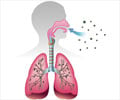Biologists at the Scripps Research Institute have uncovered a new cellular repair mechanism in a study on yeast.
A new cellular repair mechanism has been uncovered by biologists at the Scripps Research Institute in a study on yeast.
Reporting their findings in the online edition of the Proceedings of the National Academy of Sciences, they say that their work may lead to similar discovery in humans as well as new cancer treatments.The cell cycle, which allows cells to replicate their DNA and produce new cells, is controlled by a complex concert of enzymes and other components.
Besides this, say the researchers, there are "checkpoint" mechanisms that can block continuation of the process if something goes amiss.
It is by these poorly understood mechanisms that a checkpoint in the reproduction process can detect problems that interfere with DNA copying, and in turn trigger several potential responses.
"If the cycle is paused because the cell is having some problem, it can't stop and go back, so it either kills the new cell or repairs the problem," says study lead Professor Curt Wittenberg, of the Scripps Research Departments of Molecular Biology and Cell Biology.
Such checkpoint mechanisms are of great interest not only because they are such a fundamental aspect of biology, but also because problems in the cycle and its DNA repair mechanisms can lead to mutations that cause the unchecked proliferation of cells associated with various cancers.
Advertisement
In their latest study, the researchers have identified what some of those roles are.
Advertisement
They, however, add that the entire process stalls just in case a problem arises in the DNA replication process during the S phase.
"If either the replicating enzymes run into damage, or if there are insufficient precursors for making DNA, then this checkpoint response will be activated. There are two aspects to this response. One is to prevent the cycle from proceeding, and the other is to prepare the cell to deal with the damage," says Wittenberg.
He and his colleagues have discovered that during normal cell division, Nrm1's binding to DNA represses the activity of genes expressed during the G1 phase, in preparation for the subsequent S phase.
The researchers say when such stalls occur, collectively referred to as DNA stress, Nrm1's repression of the G1 genes is blocked, allowing those genes to be turned back on.
This presumably enables production of proteins needed to correct the problem that caused the stall, says the research group.
"So, now you have cells in the S phase, which don't typically express these genes, expressing them," says Wittenberg.
He says that his team could tease out Nrm1's specific activities during experiments wherein they blocked the cell cycle in yeast cells by robbing them of the precursors needed for DNA replication.
As a consequence of the stress thus induced, Nrm1 was chemically altered by a known checkpoint enzyme, resulting in the loss of binding to G1 genes.
The researchers say that this resulted in expression of the G1 genes during S phase.
As those genes encode replication and repair enzymes, re-expression of the G1 genes facilitates re-starting of DNA replication.
Wittenberg and his colleagues believe that their findings may provide fruitful targets for new cancer therapies tied to the mechanism involved.
Source-ANI
RAS/M











